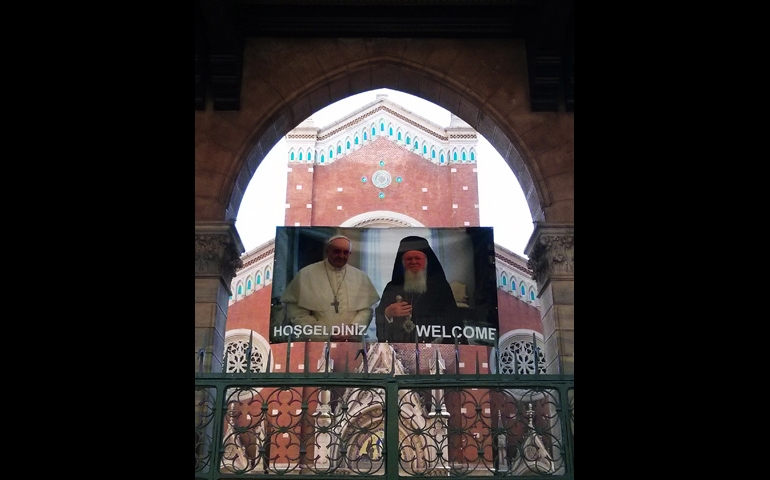
A poster displayed outside of a Catholic church in Istanbul welcomes Pope Francis, who will meet with Ecumenical Patriarch Bartholomew of Constantinople, right, on his trip to Turkey. (CNS/Nathalie Ritzmann)
One unique aspect of Pope Francis' visit to Turkey this weekend? That some in the overwhelmingly Muslim country may not even know there are Christians here for the pontiff to visit.
Illustrating that point in an interview Thursday, the bishop who leads Istanbul's Latin Rite Roman Catholic community said a Turk stopped him a few days ago as he was heading to church to ask why the building had a bell that was ringing.
"I said it was to ask for prayer," said Bishop Louis Pelâtre. "He said, 'I am Muslim; we don't do that.' I said, 'You are Muslim, I am Christian."
"Not everybody can understand it," said Pelâtre. "They think here, in Turkey, they think everybody is Muslim."
"They know there are Christians, but they do not know they are here," he continued. "For them it is something special, something outside the ordinary life."
Pelâtre, who serves as the apostolic vicar for the Latin Rite community in Istanbul, was speaking in an NCR interview ahead of the pope's visit to Turkey Friday-Sunday.
After landing in the political capital of Ankara Friday afternoon to greet Turkish president Recep Tayyip Erdoğan, Francis will spend Saturday and Sunday in the historic Christian center of Istanbul, largely focusing his time on meetings with Orthodox Christian leader Ecumenical Patriarch Bartholomew.
Throughout the visit, the pontiff will find himself in a different environment from the European Christian context. A country of some 76 million, 97 percent of Turkey's population identifies with the Islamic faith and there are estimated to be less than 150,000 Christians in the country.
Pelâtre's community, however, is even smaller. One of four main Catholic groups in Istanbul in full communion the Roman Catholic church -- among Armenian Catholics, Syrian Catholics, and Chaldean Catholics -- there are estimated to be just 15,500 Latin Rite Catholics in the city.
Pelâtre, a native of France who has lived in Turkey for 44 years and served in his role in Istanbul for 22, said that many Latin Rite Catholics who historically lived in Istanbul have now emigrated abroad. Much of his community, the bishop said, is composed of refugees from other parts of the world -- primarily Africa and other parts of Asia.
Because the community is so small, said the bishop, it cannot offer refugees all they need.
"The refugees are in need of everything," said Pelâtre. "But we do not have the possibility to give them enough. We have [the Catholic aid agency] Caritas here, but it is not sufficient."
But the biggest problem facing the Latin Rite community in Istanbul, said Pelâtre, is that the Turkish government does not recognize them legally.
While the Turkish constitution protects freedom of belief, most Christian churches are not designated as places of worship and are instead legally instituted as cultural places or centers of association. The Latin Rite community, however, does not even have that recognition.
Pelâtre said that means his community does not have legal title to the 12 parishes it operates in Istanbul.
"Our problem is the problem of property, because we are not recognized as a community under the law," said the bishop.
"Everyone talks about religious freedom," he continued. "I say it's not a problem of religious freedom."
"We have freedom of worship here," he said. "Inside of the church, we can do what we want. Outside of the church we don't have any freedom -- not any."
Recalling how one person had summarized the situation to him, Pelâtre said: "We have the water as we want but we have not the cups to drink water with. What can we do?"
"It is a big problem when we need to have restoration or repair of the churches," said the bishop. "It is always difficult to get permission from the municipality."
Asked if he thought the pope might raise some of these issues with the Turkish president in their meeting, Pelâtre said he did not think so.
"It's not the time and the place for that," he said.
Mostly, said Pelâtre, the pope's visit "is an opportunity to share who is the pope, what is the Catholic church. Because some Muslims don't know that."
After visiting Ankara Friday, Francis will head to Istanbul Saturday morning, where he will say Mass for the Latin Rite Roman Catholic community at their Cathedral of the Holy Spirit.
The pontiff will then host an ecumenical prayer and have a private meeting with Orthodox leader Bartholomew, considered "first among equals" in Eastern Orthodox Christianity.
The meeting with be the third for Francis and Bartholomew, following the patriarch's historic visit to Rome in 2013 for Francis' inauguration and their joint trip to the Holy Land last May.
The two are to meet again Sunday for lunch, after signing an expected joint declaration about the visit.
[Joshua J. McElwee is NCR Vatican correspondent. His email address is jmcelwee@ncronline.org. Follow him on Twitter: @joshjmac.]
